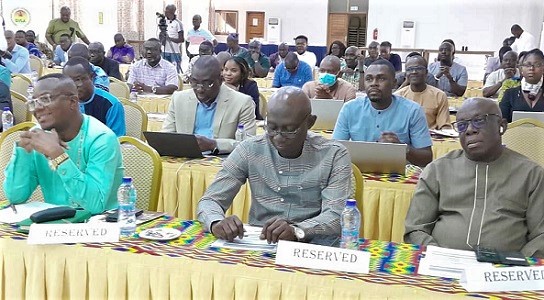
DVLA Board chair cautions staff about corruption
The Board Chairman of the Driver Vehicle and Licensing Authority (DVLA), Frank Davies, has cautioned staff against actions that can bring the name of the authority into disrepute.
He said any negative acts from staff affected the image and reputation of the business, and advised the staff to be mindful of their actions, particularly when dealing with clients.
He said that was to enable the public to continue to have confidence in the activities of the authority.
Mr Davies made the call in an address read on his behalf at this year's mid-year review conference of the DVLA at Koforidua in the Eastern Regional last Wednesday.
The board chairman’s comments followed recent findings on corruption in the country that put the DVLA at the fifth position on the list of corrupt agencies and organisations, and described it as “worrying”.
The mid-year review was dubbed: "Consolidating our gains and building on efficient technology-led service culture at DVLA beyond COVID-19”.
It was attended by staff of the authority from various parts of the country to take stock of the previous year’s activities and plan for the future.
Remaining upbeat
Mr Davis said despite the report, the staff needed not be downhearted but to continue to be positive and well poised in the good they were doing.
He said it was for them to prove otherwise by doing what was right with regard to their duties and responsibilities, saying that was crucial instead of trying to argue against it.
He further urged the staff not to expect that everybody would like them, given what their roles entailed, saying “I am proud of what you do, and you can always count on my support”.
To address some of the challenges, including security and safety, Mr Davies said the board had requested the provision of armed police personnel at its office at Weija in Accra and others due to the vast areas their operations covered.
Such a decision, he indicated, was due to the current spate of attacks and armed robbery in the country, adding that “it would help to protect money realised daily in such offices, as well as the lives of personnel”.
He said the Weija office, which was being given a facelift, would commence business before the end of the year in a more conducive environment for both the staff and clients.
Mr Davis also stated that the authority would not only build on its gains regarding its digitalised systems, but would continue to explore new ideas regarding on its operations to put it on a higher pedestal.
He said the DVLA had learnt lessons from COVID-19 and would invest in the right technologies that would sustain the organisation to make it relevant, saying “organisations that failed to invest in the right technologies would not survive the next decade”.
Ministry’s commitment
The Deputy Minister of Transport, Frederick Adom Obeng, said the ministry was committed to improving the governance and regulatory framework for the effective execution of DVLA’s mandate in the application of the limited resources available to the authority.
He pointed out that the DVLA had achieved significant successes in recent years, and was, therefore, on track to become one of the best performing public institutions in the country.
On the issue of Road Traffic Regulations, 2012, L.I. 2180, Mr Obeng stated that some provisions needed to be revised, while putting others into effect, including those related to the installation of speed limits, tachograph and the issuance of commercial vehicle driving licence, among others.
He called on the management and the board of the DVLA to step up their collaboration with relevant stakeholders to ensure that the regulations were implemented to the letter.
He said the DVLA operations were critical to the promotion of road safety in the industry, adding that it was important that the authority strengthened its collaborations with the National Road Safety Authority, the Motor Traffic and Transport Department of the Police Service and other stakeholders in the road transport sector.
Best policy reforms
The Chief Executive Officer of the DVLA, Kwasi Agyeman Busia, said an institution such as the DVLA, described by the public as the most corrupt had produced the best administrative set-up and policy reforms in three straight years.
He urged the staff not to be overcome by the corruption issue, but to remain committed, focused and determined to perform creditably.
